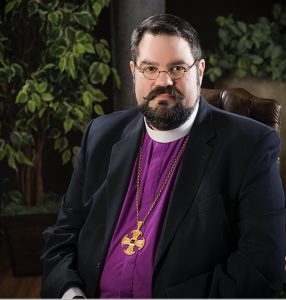This column was originally published in the December print edition of the Anglican Journal.
By William G. Cliff

The two thousand year old birth of a refugee child in Bethlehem should make no difference at all. There was no one expecting this child to be born except his mother and embarrassed father. Israel is entirely the wrong end of the Roman empire to be truly important. It was the sort of province one got sent to as a form of punishment. Rome, the centre of things is far away, and the powerful and rich sleep comfortably in their beds confident that nothing will upset the empire they have worked hard to build. In a conquered Israel, the birth of this baby should make no difference at all. There may be grandiose claims about his ancestry, but his mother, who found herself pregnant before she should have been, is a nobody. His father too, was a nobody. A carpenter and generation older than he should have been.
They had come from a village that no one cared about and they had travelled to a city whose glory had departed in spite of once being the home of King David. Babies do not wait for auspicious times or places to be born — they arrive when they arrive — and this one is born in an even more insignificant place than usual: a barn, because as it usually happens, the powerful make edicts, and the poor are moved about against their will and at someone else’s convenience. In the crush of people obeying an edict about tax from the most powerful, there was no room for a proper place to be born. They made do with what they had. This birth should have made no difference at all; but it has made all the difference in the world.
Even the announcement of the birth was wrong. Foreigners and poor folks are the wrong people in the wrong places. Foreign astrologers were not the kind of respectable people good folk usually received on the birth of a child. The rabble of shepherds who crowded the door and craned their necks to see the baby were an unusual group to be heralds of a new kingdom — but there they were. Jostling and whispering and telling stories of angels and choirs, mangers and signs, the shepherds made the whole thing that much more absurd.
We believe that the roman world which was dark and cold suddenly became warmer because the least and the lost of the roman empire were sent a message that night. The message was delivered in entirely the wrong place to make an impression on the powerful, but instead it came as the very best of news to those who had very little good news in life. The poor and the disenfranchised heard this message, and it came as a message of light and hope in a dark and uncertain time. The birth of this child, on this particular night would eventually become a message to the whole world: that in the midst of the fear and alienation; the poverty and indifference of the powerful; hunger and the yearning for better things, that God showed up in a manger in Bethlehem.
The prophets of old often spoke of light breaking out in darkness and salvation appearing when and where it was unexpected. Christmas is the story of when and how God showed up. The light was kindled in the darkness and the message from the highest (the angels) to the lowest (the shepherds) announced God’s gracious turn to the creatures fashioned from clay.
The God who had walked with humankind in the garden would now walk again with them in the person of Jesus. The world is still dark and uncertain, and it would seem that it is more so now than it was then. The rich and powerful still sleep comfortably in their beds, confident that nothing will challenge their empire. The poor and dispossessed are still migrating across deserts seeking safety from murderous tyrants. The contradictions of the ancient Roman Empire have only been amplified. Hunger and plenty, war and peace, rich and poor, oppression and ambivalence, slavery and indulgence are all still part of the world twenty centuries after this little boy was born. Women who find themselves homeless and worried about the future still seek a place to lay their children down that is safe. Fathers still dream about finding a way to a promised land.
These are the contradictions that need to be faced. We believe that this birth long ago has changed everything. It seems however that so little has in fact changed. The message of the angels still contains hope for us, because in the midst of the terrible mess humans have made, God shows up. The fact that God showed up and has never deserted us since is the reason we can begin to once again address those contradictions. Jesus walks with us still, proclaiming a message of good news to the world through us — that God is not distant or ambivalent about the creation or the terrible darkness we have manufactured for ourselves with our greed and our hatred and our indifference to the suffering of one another. Rather, those contradictions are why God shows up. We are the reason why Christ came. That is the greatest gift, to celebrate the tremendous gift of a God who shows up. We may be the wrong people, in the wrong place. We may even be nobodies — but that is who the good news is for. Christ was born in the wrong place, to the wrong people at the wrong time — and that has made all the difference.
Interested in keeping up-to-date on news, opinion, events and resources from the Anglican Church of Canada? Sign up for our email alerts .
